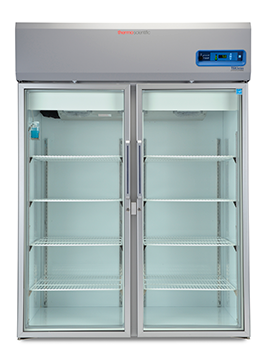How the ACT Label Supports Your Sustainability Goals
For many scientists who see themselves as environmentally conscious, the scale of their total carbon footprint can be a wake-up call. Laboratories are under increasing pressure to adopt more sustainable practices, lower their environmental impact, and contribute to a cleaner and safer society. But what can be done to make scientific research and industry more eco-friendly?
Updated laboratory equipment can play a significant role in increasing the sustainability of science. Manufacturers and equipment providers are turning to new methods to help reduce their carbon footprint. The latest technologies are enabling the development of reusable labware made from non-toxic materials, and sustainable manufacturing processes have led to more energy-efficient cold storage products, like ultra-low-temperature freezers.
Coupled with these technological advances, important initiatives such as the Accountability, Consistency and Transparency (ACT) program from My Green Lab empower laboratory managers to make better informed decisions when purchasing products. ACT and programs like it aim to help laboratories develop more environmentally conscious purchasing habits and adopt greener measures that will make the scientific sector more sustainable.
The ACT Label

The ACT label contains several environmental impact scores for lab products, instruments, and reagents, much like an eco-nutrition label. It breaks down each product into several categories, including information about manufacturing (shipping impact and renewable energy use), user impact (water consumption and product lifetime), and end of life (how recyclable, compostable, or biodegradable the product is after disposal). By emphasizing the accountability (A), consistency (C), and transparency (T) of the environmental impact of laboratory products, it helps labs easily compare options and enables users to make more environmentally sustainable choices. The ACT label also gives manufacturers the opportunity to promote their commitment to sustainability by highlighting the areas in which their manufacturing processes are more efficient and sustainable.
While participation in the ACT program is not compulsory, it benefits the industry by encouraging manufacturers to improve the sustainability of their products, helping them understand how customers might value, for example, manufacturing using renewable energy or more recyclable packaging materials. The hope is that this sets a precedent for the sector and helps customers make environmentally informed selections of hardware and services. The goal is to motivate companies across the equipment, reagent, and services supply chain to champion and participate in driving to make science more sustainable.
Partners in Sustainability
Thermo Fisher Scientific has partnered with My Green Lab to highlight products that meet the ACT label criteria for sustainable manufacturing. Thermo Fisher’s entire cold storage portfolio of more than 1,200 products will be ACT label-certified, enabling research, pharmaceutical, and clinical laboratories using these instruments to meet their sustainability objectives while preserving the integrity and viability of stored materials.
The first Thermo Fisher cold storage solutions to receive the ACT label were Thermo Scientific TSX Series Ultra-Low-Temperature (ULT) Freezers and Thermo Scientific Standard-Performance (STP) Ultra-Low-Temperature Freezers, with more than 200 models receiving certification. These state-of-the-art ULTs reduce energy usage up to 70 percent compared with conventional options. Thermo Fisher’s ULT freezers were also among the first to receive ENERGY STAR certification from the U.S. Environmental Protection Agency (EPA). The systems are powered by Thermo Fisher’s unique V-drive technology, which detects and adapts to changing usage patterns and adjusts compressor speed as needed, offering significant energy savings without compromising performance.

In addition to ULTs, Thermo Scientific TSX Series High-Performance Laboratory Refrigerators and Freezers were the first cold storage units in the industry to receive ACT label certification. The new ACT label certification covers all models and sizes of TSX Series High-Performance Refrigerators and Freezers, including those designed for chromatography, blood banking, plasma storage, vaccine storage, and general-purpose laboratory use. TSX Series High-Performance Refrigerators and Freezers, which also use V-drive technology, are ENERGY STAR certified and offer similar performance and energy saving capabilities.
Our Commitment
Thermo Fisher Scientific is committed to sustainable manufacturing for the entire TSX and STP product lines. In addition to using natural hydrocarbon refrigerants, Thermo Scientific cold storage products use SNAP-compliant, water-blown foam insulation that helps minimize heat emissions, allowing for considerably lower heating, ventilation, and air conditioning (HVAC) costs. The equipment is also manufactured in an award-winning, zero waste-to-landfill facility and care is taken to maintain eco-friendly supply chains, with raw materials purchased from sustainable sources. For example, TSX Series Refrigerators and Freezers are manufactured with increasingly long lifespans and shipped in packaging with high recycled and recyclable content and include recycling instructions for the recipient. At the end of a product’s life, we can also help with repurposing and recycling.
New drives in the industry and a greater emphasis on sustainable manufacturing are helping scientists reduce the carbon footprint of their work. Moreover, initiatives like My Green Lab’s ACT standard help customers make purchasing decisions based on a product’s environmental impact and provide access to greener products and manufacturers. Together, manufacturing more eco-friendly equipment, greener supply chains, and environmentally conscious purchasing decisions can and must make a difference to the sector’s record on carbon dioxideemissions.

